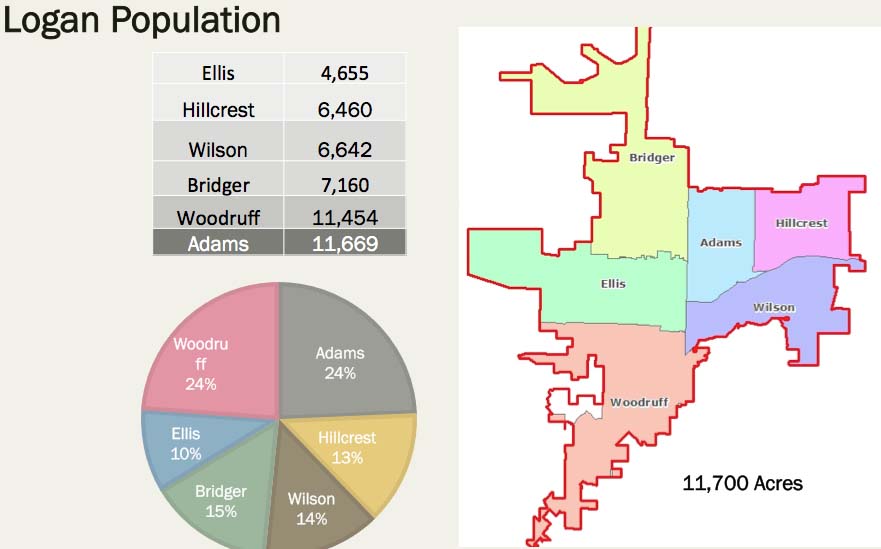Because candidates from the affluent Hillcrest and Wilson neighborhoods have been traditionally over-represented on the Logan City Council since 2009, a citizens committee is recommending a transition to by-district voting for that municipal panel.
LOGAN – A committee of city residents representing Logan’s diverse neighborhoods has recommended that the city move to by-district voting for its municipal council.
Five of the six neighborhood representatives on that committee voiced support for the change from Logan’s current at-large system to by-district voting for city council members.
They are Sherilyn Wilson from the Bridger neighborhood, Gail Yost from the Wilson neighborhood, Keegan Garrity from the Woodruff neighborhood, Tiffany Vail from the Adams neighborhood and Craig Christensen from the Ellis neighborhood.
Only Kent Field, representing the affluent Hillcrest area, dissented from that opinion.
In a report recently delivered to the Logan City Council, the majority of committee members supported the idea that implementing by-district voting would facilitate broader representation on the city council.
“Doing so,” their report contends, “would come at no additional cost to the city and will increase the likelihood that the composition of the council more accurately reflects the city’s population, a population that is expected to grow and become more diverse as time goes on.”
In his dissenting opinion, Field argued that district-based representation would deprive residents city-wide of the opportunity to have a say in the election of all five members of the Logan City Council.
Ideally, Field added, a city council candidate should have to garner support from a substantial number of voters to win a seat on the municipal panel. But, given a typical voter turnout of 24 percent or less in municipal election, a candidate in a district-voting system could win with just hundreds of votes rather than thousands.
At-large representation has been the rule on the Logan City Council since 2009. Despite the fact that nearly two-thirds of Logan’s population lives west of Main Street in the Bridger, Ellis and Woodruff residential districts, there has never been more than one council member from the city’s west side on the municipal panel in the past 11 years.
Under Logan’s declared seat system previous to 2009, at least two council members always hailed from the west side of town.
The committee report also emphasized that, since 2009, two of the city’s six neighborhoods – Hillcrest and Wilson – have produced twice as many elected officials as the other four areas combined. The committee members noted that those two neighborhoods are the city’s wealthiest and least diverse areas. They also have Logan’s highest percentage of owner-occupied housing.
In October 2019, the Logan City Council agreed to form a citizen committee to evaluate voting systems following a contentious meeting during which former city council member Jess Bradfield urged that panel to voluntarily adopt an ordinance implementing by-district election of council members.
As designated by former city council chair Amy Z. Anderson, the citizen committee’s charter was to examine the council’s current representation history, make comparisons to peer cities, identify pros and cons of a change in election process, investigate the legality of any election process change and seek consensus and/or minority opinions on the proposed change.
According to their report, the committee members based their final recommendation on 20 years of historical voting data; neighborhood demographic data including income, ethnicity and housing dynamics; comparison to other peer cities in Utah; and informal interviews with Logan residents.
The committee report noted that their charter precluded citywide polling of voters’ opinions on this issue and recommended that the city itself undertake such a survey to determine if residents feel adequately represented by the city council as it is currently organized.
The committee members recommended that Logan adopt a district-based voting system similar to those used by local school boards, the Cache County Council, the Cache Water District and the Utah House of Representatives. They urge that implementation of that new system be completed in time for the municipal election in 2023.
Initial discussion of the citizen report will take place during the Logan City Council meeting on Tuesday. Due to coronavirus precautions, that meeting will take place via Zoom technology.

